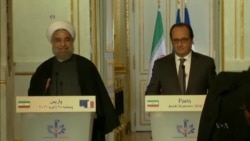Iran is open for business. That’s the message from President Hassan Rouhani during his milestone visit to Europe.
With most sanctions lifted as a result of its agreement to dismantle its nuclear program, Iran has embarked on a charm offensive to extol the economic opportunities on its territory and to free itself from years of international isolation.
But some Middle East experts don’t expect American companies to jump in too soon.
Arriving in France this week, President Rouhani said his visit aims to strengthen Iran's ties with the European Union and enhance international relations. He wasted no time, buying more than 100 Airbus passenger planes worth $27 billion and signing additional multi-billion dollar deals with France and Italy.
It’s a charm offensive aimed at softening the West’s hardline image of Iran, says market economist Peter Cardillo.
“I think what we’re going to see here is a rush of companies trying to get their share of the market in Iran," he said.
Despite the opportunities, American companies may want to proceed with caution. Speaking with VOA’s Persian Service, Middle East expert Ken Weinstein, at the Hudson Institute, says some U.S. sanctions remain to prevent future nuclear violations by Iran.
“[US companies'] general counsels have to be concerned, because some of these sanctions could have potential impact on their operations in Iran and elsewhere," he said.
U.S. rhetoric in an election year could also add to the uncertainty in US-Iran relations. Weinstein says much will depend on how Iran’s government proceeds.
“If the Iranian regime moves away from the ballistic missile program, if it moves away from aggressive actions in neighboring countries, if it begins to respect human rights — rights of women, rights of minorities — the issue of sanctions becomes much less of a problem," he said.
Analysts say Iran may be adding to the uncertainty by engaging with European companies, perhaps to drive a wedge between the U.S. and Europe. But with the price of oil, its major source of revenue, likely to remain low, economist Cardillo says Iran will do what’s best for Iran.
“It’s probably going to take time for them to really get production up to the point where they’re going to have major revenues coming in as far as the oil side is concerned, so they’re out there trying to make deals," he said.
After years of isolation, Iran is eager to sell its attributes. With a market of 80 million people and an annual output of $400 billion, Iran is the biggest economy to rejoin the global trading system since the break-up of the Soviet Union in 1991.











